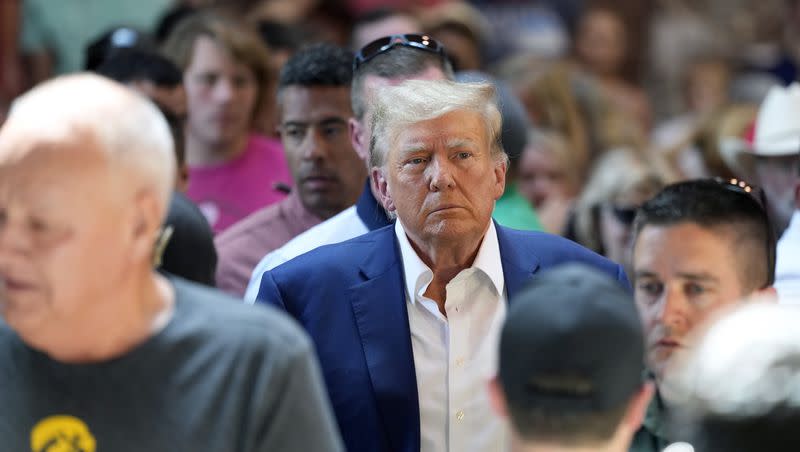79% of Iowa Republicans are considering someone besides Trump

- Oops!Something went wrong.Please try again later.
- Oops!Something went wrong.Please try again later.
A new CBS/YouGov poll shows that 79% of Republican voters in Iowa and 77% in New Hampshire are not committed to voting for former President Donald Trump.
The survey, conducted in Iowa and New Hampshire between Sept. 15-24, found that more Republican voters in the two states have ruled out voting for Trump than have decided they will back him.
In Iowa, 20% of Republican voters say they are only considering Trump, while 48% are choosing between the former president and other candidates. Thirty-one percent say they have ruled out casting a vote for Trump.
In New Hampshire, of Republican voters surveyed, 23% say it’s Trump only, while 34% have ruled him out. That leaves 43% who are considering Trump and at least one other candidate.
Related
How do the other candidates stack up?
Even though voters are considering other candidates, Trump is still the far-and-away leader among primary Republican voters in both states. He sits at 51% in Iowa and 50% in New Hampshire. Voters are split among his challengers. Florida Gov. Ron DeSantis comes in at No. 2 and former S.C. Gov. Nikki Haley at No. 3 in both states, and then the order shifts between the two.
In Iowa, DeSantis is at 21%, Haley is at 8%, S.C. Sen. Tim Scott and former Vice President Mike Pence are both at 6%, businessman Vivek Ramaswamy is at 5%, and both former N.J. Gov. Chris Christie and and Arkansas Gov. Asa Hutchinson are at 1%.
In New Hampshire, DeSantis has dropped to 13%, Haley is at 11%, then Ramaswamy and Christie are tied at 8%, Tim Scott is at 5%, Pence and North Dakota Gov. Doug Burgum are both at 2% and Hutchinson is at 1%.
Trump’s perceived strengths and winning strategy
Trump supporters say that he is “prepared” and a “strong leader,” who is also the only candidate that most voters think would “definitely beat” President Joe Biden in a head-to-head match-up.
Voters also differ in what they perceive as a winning strategy for Trump. In Iowa, 56% of Republican primary voters say it’s more important to motivate the base than to appeal to moderates and independents. In New Hampshire, only 41% think appealing to the base is the winning strategy.
The winning strategy, according to 59% of primary Republican voters in New Hampshire, is to appeal to moderates and independents.
Why it matters
Polling months away from the primary election and more than a year away from the general election can give only a snapshot in time. It matters, though, because it gives a glimpse into statistical modeling that can begin to predict delegate numbers for each candidate.
This week’s polling gives a delegate range for each candidate today, not where things will end up next year. CBS reports that Trump’s current support translates to between 18 and 23 delegates in Iowa, where delegates are allocated proportionally based on the statewide vote. DeSantis is in a distant second with 6 to 10 delegates, and the rest of the field tends to pick up at most a few delegates each.
In New Hampshire, where candidates have to win at least 10% of votes statewide to qualify for any delegates, Trump dominates. The CBS/YouGov simulations indicate his support translates to between 14 and 20 delegates, even though only half of the state’s primary voters name him their first choice. There are four candidates hovering around the 10% threshold: DeSantis, Haley, Christie and Ramaswamy. In some simulations, they qualify for a few delegates. In many, they fall a little short and get nothing, which would extend the front-runner’s lead.
Holly Richardson is the editor of Utah Policy.

